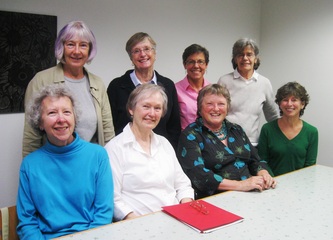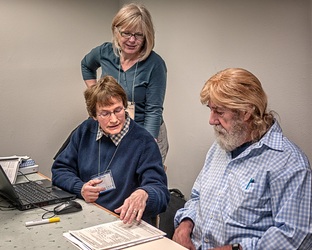Adult Services Manager
Kitsap Regional Library, November 2013 - Present
Our ten-branch system (9 buildings + a Bookmobile) serves a population of approximately 250,000 people, upwards of 70% of whom are adults. Our service area includes a diverse, low-income city, a military community, two Native American reservations, a wealthy suburb on an island, and unincorporated rural areas.
I manage the Adult Services team, which is made up of 8 librarians (7.75 FTE) across several departments and a wide geographic area. The department's annual budget is $140,000. We are united by a common vision that articulates our unique value proposition no matter who we serve: to be the human connection to information and inspiration in our adult communities.
Our greatest opportunity and challenge lies in working together to meet the diverse needs of our communities. That's why the position of Adult Services Manager was created, and I am the first to step into this role. I help us think as a system and advocate for Kitsap's adults with one voice. By bringing together our diverse strengths and experiences, we can make measurable progress towards an exciting shared vision. We are learning to set goals, draw on each other's strengths, pool our resources and planning efforts, manage change, communicate our value, be leaders and mentors throughout KRL, and think long-term about what is best for our community.
In terms of regular tasks, I organize and run weekly online meetings, monthly in-person larger meetings, and two annual retreats. I make sure that everyone has the equipment and support they need to work together. I facilitate communication and group decision-making between Adult Services and other parts of the system, and act as a representative and advocate for AS.
Staff development and mentoring are an important piece of my role. I meet monthly with each librarian and additionally as needed to provide feedback and coaching, and to ask about any tools, training, or opportunities that would help them grow and succeed. My feedback is prompt and straightforward, balancing recognition of strengths and celebration of successes with areas for improvement. I participate in identifying and allocating funds for conferences, courses, and other off-site professional development opportunities. In-house, I work with our training coordinator to create or arrange the training my team needs, as well as that which my team can provide to others in the organization.
My biggest success is when my staff succeed. I'm thrilled to be in a role where I can provide them with tools and opportunities to thrive. Nothing is more fun that getting to shout their big wins from the rooftops.
A unique aspect of this role is that I am a matrix manager. This means that none of my team members report to me directly. Each is a direct report of the branch manager in the location where they primarily work. This is effective because their direct managers see them on a daily basis, and so can provide a fuller range of oversight, prompt feedback, and performance evaluation. Branch managers also need to have direct oversight of librarians' schedules in order for the branch to function. As a result, I need to lead my team more through influence than through authority. I work with them to develop vision, strategy, and feasability, and then I rely on them to return to their branches and bring that to life locally, with limited oversight from me. In order for us to be effective as a team, I need them to have strong trust and buy-in for what we do and why. I also need to collaborate closely with each branch manager to make sure we are communicating aligned expectations to the librarians. Overall, being in this role has made me a more collaborative, accountable, and I believe stronger manager.
It's a tall order, and I couldn't love it more!
I manage the Adult Services team, which is made up of 8 librarians (7.75 FTE) across several departments and a wide geographic area. The department's annual budget is $140,000. We are united by a common vision that articulates our unique value proposition no matter who we serve: to be the human connection to information and inspiration in our adult communities.
Our greatest opportunity and challenge lies in working together to meet the diverse needs of our communities. That's why the position of Adult Services Manager was created, and I am the first to step into this role. I help us think as a system and advocate for Kitsap's adults with one voice. By bringing together our diverse strengths and experiences, we can make measurable progress towards an exciting shared vision. We are learning to set goals, draw on each other's strengths, pool our resources and planning efforts, manage change, communicate our value, be leaders and mentors throughout KRL, and think long-term about what is best for our community.
In terms of regular tasks, I organize and run weekly online meetings, monthly in-person larger meetings, and two annual retreats. I make sure that everyone has the equipment and support they need to work together. I facilitate communication and group decision-making between Adult Services and other parts of the system, and act as a representative and advocate for AS.
Staff development and mentoring are an important piece of my role. I meet monthly with each librarian and additionally as needed to provide feedback and coaching, and to ask about any tools, training, or opportunities that would help them grow and succeed. My feedback is prompt and straightforward, balancing recognition of strengths and celebration of successes with areas for improvement. I participate in identifying and allocating funds for conferences, courses, and other off-site professional development opportunities. In-house, I work with our training coordinator to create or arrange the training my team needs, as well as that which my team can provide to others in the organization.
My biggest success is when my staff succeed. I'm thrilled to be in a role where I can provide them with tools and opportunities to thrive. Nothing is more fun that getting to shout their big wins from the rooftops.
A unique aspect of this role is that I am a matrix manager. This means that none of my team members report to me directly. Each is a direct report of the branch manager in the location where they primarily work. This is effective because their direct managers see them on a daily basis, and so can provide a fuller range of oversight, prompt feedback, and performance evaluation. Branch managers also need to have direct oversight of librarians' schedules in order for the branch to function. As a result, I need to lead my team more through influence than through authority. I work with them to develop vision, strategy, and feasability, and then I rely on them to return to their branches and bring that to life locally, with limited oversight from me. In order for us to be effective as a team, I need them to have strong trust and buy-in for what we do and why. I also need to collaborate closely with each branch manager to make sure we are communicating aligned expectations to the librarians. Overall, being in this role has made me a more collaborative, accountable, and I believe stronger manager.
It's a tall order, and I couldn't love it more!
Bookmobile/Outreach Manager
Kitsap Regional Library, 2015-present
In addition to Adult Services, I manage our Bookmobile/Outreach Department. It consists of 7 people (5.75 FTE), 3 vehicles (a Bookmobile plus two Outreach vans), and an annual budget of $300,000. The Bookmobile/Outreach Supervisor is my direct report, and she in turn supervises the rest of the staff. The Bookmobile maintains its own collection, and Outreach houses a small collection of Large Type books and 22 deposit collections.
Several employees who had been in the department for decades recently retired within a short span. That turnover has opened up unprecedented opportunities for change and innovation. We worked to preserve their institutional knowledge while also opening the department to new people and ideas.
Early results of this new climate include:
So much change at once isn't always easy, but we are committed to supporting each other and our patrons as we realize a new vision together.
Several employees who had been in the department for decades recently retired within a short span. That turnover has opened up unprecedented opportunities for change and innovation. We worked to preserve their institutional knowledge while also opening the department to new people and ideas.
Early results of this new climate include:
- developing a shared mission, goals, and strategies for the department
- working as a single team, rather than silos of BK and OR staff
- building shared language that reflects our values
- educating and including the rest of the system, so all staff understand and can connect patrons with our previously hidden services
- developing clear, shared criteria for Bookmobile stops, soon to lead to our first public application for Bookmobile service
- creating efficiencies in high-touch, high-time Outreach home delivery service while maintaining or increasing service excellence
- reviewing and updating our neglected collections procedures
- coordinating with the branch locations to create a spectrum of Outreach services, allowing some homebound patrons to maintain their connection to their branch libraries as they age.
So much change at once isn't always easy, but we are committed to supporting each other and our patrons as we realize a new vision together.
Bainbridge Branch Adult Volunteer Coordinator
Kitsap Regional Library, October 2011 - November 2013
I am so lucky to work in a community that fervently supports its library. I have an overabundance of volunteers! At any given moment, I oversee more than 50 active volunteers directly, and indirectly over 200 that are inactive or working with auxiliary groups like the Friends. They represent a wide range of desires and aptitudes, from a young man building his resume to a developmentally disabled woman looking for independence to seniors looking to make meaningful contributions. I interview each volunteer candidate to determine their interests, abilities, and level of commitment to settle on an individualized set of tasks. I manage their hours and tasks in the database Volgistics. After I train the volunteers, I stay in regular contact to see if adjustments are needed.
In addition to supporting each individual, at times larger-scale change management has been important. For example, a sudden switch was made to an electronic touch-screen sign-in system when we previously used paper. I was glad for this change because previously there was no standardized way for volunteers to record their hours; each did it in their own way. Because of this, the library was not always able to accurately report all the hard work and wonderful contributions of our volunteers. Despite the fact that the result would be positive, I knew the transition would be difficult for some of my users, especially seniors. To ease the transition, I sent out as much warning as possible. I placed the sign-in computer near my desk so that I would be easily accessible to answer questions. I provided print instructions as well. When technical concerns arose, such as difficulty reading the screen, I listened to my volunteers’ concerns and advocated for their needs with IT. After only a short time, everyone had adjusted happily and most even prefer the new system. As an added bonus, some of my developmentally disabled volunteers find this system easier to use, and are also developing their computer skills!
In addition to supporting each individual, at times larger-scale change management has been important. For example, a sudden switch was made to an electronic touch-screen sign-in system when we previously used paper. I was glad for this change because previously there was no standardized way for volunteers to record their hours; each did it in their own way. Because of this, the library was not always able to accurately report all the hard work and wonderful contributions of our volunteers. Despite the fact that the result would be positive, I knew the transition would be difficult for some of my users, especially seniors. To ease the transition, I sent out as much warning as possible. I placed the sign-in computer near my desk so that I would be easily accessible to answer questions. I provided print instructions as well. When technical concerns arose, such as difficulty reading the screen, I listened to my volunteers’ concerns and advocated for their needs with IT. After only a short time, everyone had adjusted happily and most even prefer the new system. As an added bonus, some of my developmentally disabled volunteers find this system easier to use, and are also developing their computer skills!
Librarian-in-Charge, Milwaukee Public Library Forest Home Branch
June 2011 - October 2011
It’s always an interesting situation when the person officially “in charge” is the one who knows the least about the day-to-day policies of the library. I recently transferred to this branch, which is full of wonderful, experienced staff who also happen to be mostly paraprofessionals. Though they know the ins and outs of the building, the local policies and norms, the regular patrons, and the neighborhood far better than I do right now, in the branch manager’s absence (about half the time, since he runs two branches) they look to me to make final decisions. I’m treading carefully, trying to balance being authoritative but not trampling on the greater knowledge base of my team. And I’m a little surprised to find that I love it!
This is a situation where thinking of myself as a team facilitator really bears practical fruit. I’m very comfortable turning to one of my more experienced coworkers and asking questions. They know I value their opinions and knowledge, and I listen to what they have to say. Because I’m not nervous or ashamed to learn from them, they’re comfortable sharing with me without feeling like I lack authority. It’s been (and will continue to be!) a fun process of learning my new home and getting to know the people I work with. I realized I honed this skill while teaching GMAT test prep courses a few years ago. I was decades younger than many of my students, and I had to learn how to gain their trust and respect before they could learn what I had to teach – test-taking skills that complemented their life experiences. In both cases, I remind myself that there’s no point in pretending these gaps in age or experience aren’t there. In any situation, every team member will have unique strengths and experiences. By embracing them and agreeing to learn from each other, we can create the healthiest work environment and, most importantly, give the best possible service to our patrons.
This is a situation where thinking of myself as a team facilitator really bears practical fruit. I’m very comfortable turning to one of my more experienced coworkers and asking questions. They know I value their opinions and knowledge, and I listen to what they have to say. Because I’m not nervous or ashamed to learn from them, they’re comfortable sharing with me without feeling like I lack authority. It’s been (and will continue to be!) a fun process of learning my new home and getting to know the people I work with. I realized I honed this skill while teaching GMAT test prep courses a few years ago. I was decades younger than many of my students, and I had to learn how to gain their trust and respect before they could learn what I had to teach – test-taking skills that complemented their life experiences. In both cases, I remind myself that there’s no point in pretending these gaps in age or experience aren’t there. In any situation, every team member will have unique strengths and experiences. By embracing them and agreeing to learn from each other, we can create the healthiest work environment and, most importantly, give the best possible service to our patrons.



